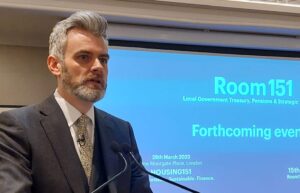What regulatory response can be expected following the publication of the Good Governance project’s Phase 3 report and the closure of the Single Code of Practice consultation? Susan Black offers an unusual analogy to demonstrate the impact on the LGPS.
Regulators and legislators can get a bad rap, but they are in fact much like the heroes of my favourite 80s TV show, Cagney and Lacey (it’s a stretch but I like a TV or film analogy, so go with it). Mary Beth (Cagney) was a professional, juggling her police duties, husband, and kids, much like the wide-ranging remit of the Department for Levelling Up, Housing and Communities (DLUHC). Christine (Lacey) was single-minded in her dedication to the force, just like The Pensions Regulator (TPR). Together they were formidable. So where do we see commonality in the approaches of DLUHC and TPR?
Following publication of the Phase 3 report from the LGPS Scheme Advisory Board’s Good Governance (GG) Project and the closure of TPR’s Single Code of Practice (SCOP) consultation, we are anticipating further regulation. Whilst the detail may change, I see three common themes:
-
Relationships and participation
Cagney and Lacey always had a different investigating style, but their aim was the same: We can see that both DLUHC and TPR are keen to drive wider participation in the governance and running of the LGPS in a safe and controlled way.
The GG report makes recommendations on internal structure and the appointment of a senior LGPS officer, but the report also looks outside the core of the fund and focuses on relationships with members and employers, seeking that:
- each fund produces and publishes a policy on the representation of scheme members and non-administering authority employers on its committees and explains its approach to voting rights for each party; and
- each administering authority documents key roles and responsibilities relating to the LGPS and publish a roles and responsibilities matrix setting out how key decisions are reached.
The draft SCOP also looks at relationships and participation but focuses on the third parties who are involved in the provision of services and advice to funds. Public service schemes already need to comply with extensive procurement rules. The section within the SCOP on managing service providers should be helpful to LGPS funds that outsource services such as pension administration. It sets out best practice in relation to the management of the relationship.
The common theme across the draft SCOP and the GG is simple: increase participation in governance, focus on knowing who does what and on tracking and monitoring that those things are working. So, what should we do now?
Many funds will already have clearly defined and understood roles and responsibilities and sophisticated supplier management processes. However, irrespective of how well you believe things to be documented and managed, it is always a good idea to review where you are and make improvements. In any event, the SCOP envisages regular review of your provider arrangements, and changes in committees and boards should always prompt a need to relook at and relaunch roles and responsibilities.
I would suggest five steps to get started:
- Pull together a list of decision-making bodies including but not limited to the committee and board. Consider whether the committee has delegated any decision-making to other groups and make sure decisions around suppliers are captured.
- Prioritise the most important of these bodies to start your review.
- Gather all the relevant paperwork such as terms of reference, role profiles, minutes of meetings, key supplier contracts, service-level agreements and performance indicators.
- Review against the provisions of the SCOP and GG or seek an independent review from a third party.
- Once you have assessed the most important bodies you should have a good process in place to review others across the year.
Planning to do this regularly will mean that it should not become a huge task as small changes are picked up and amendments made on an on-going basis.
-
Evidence
This is a pretty obvious cop show analogy. Regulators and cops both want to see evidence, but it is worth remembering that there is a key difference: Cagney and Lacey wanted evidence for a conviction, whereas regulators want evidence for peace of mind.
The GG report sets out two particular forms of evidence:
- Each administering authority must publish an annual governance compliance statement co-signed by the LGPS senior officer and s151 officer (where they are different people); and
- Each administering authority must undergo a biennial Independent Governance Review and, if applicable, produce the required improvement plan to address any issues.
The draft SCOP focuses more on risk management. While it does not seek to impose the provisions relating to the Own Risk Assessment (ORA) onto LGPS Funds, they are required to “establish and operate internal controls which are adequate for the purpose of securing that the scheme is administered and managed in accordance with the scheme rules”.
To show compliance with this aspect of the draft SCOP, the fund will need to demonstrate that adequate internal controls are in place and operated. The code maintains that, at a minimum, internal controls should be documented and reviewed at least annually or when there is substantial change or some failure or deterioration in their performance.
From my experience of LGPS funds, risk management is already happening so, again, what should we do now?
It would be useful to consider the risk management processes that are already in place, ensuring there is clarity around:
- What the internal controls are
- How the fund can show that the internal controls are working as desired; and
- How reviews of internal controls are evidenced
The draft SCOP provisions around internal controls are helpful, giving both definitions of internal controls and guidance around what to consider when designing internal controls.
A useful exercise would be to use the provisions of the code to review the suite of internal controls you currently have and either take comfort or remedial action.
Take the Room151 IFRS9/MRP survey today
Make sure your views are heard on these important subjects
-
Education, education, education
I found it hard to believe that a show as good as Cagney and Lacey wasn’t always popular, although it turns out that is not a view supported by all my Hymans Robertson colleagues. In the early 80s it was cancelled but, following a concerted effort by fans to educate TV execs and the public, the show was reprieved. Both GG and draft SCOP recognise the power of education.
GG seeks to introduce requirements for:
- key individuals within the LGPS, including LGPS officers and pensions committees, to have the appropriate level of knowledge and understanding to carry out their duties effectively.
- s151 officers to carry out LGPS-relevant training as part of continuing professional development requirements to ensure good levels of knowledge and understanding.
The draft SCOP seeks to ensure that those involved in the management of schemes have, or can acquire, the appropriate levels of knowledge and understanding and to keep these up to date.
How to ensure that you have good, accessible, and well-used training is a topic all of its own for those involved in the running of funds. However, if you were starting anywhere, I would suggest you baseline the knowledge that exists, then create a realistic plan to build upon that.
Encouraging people to engage and access training and education can be a challenge but perhaps we just need to remind people of the great loss that would have been the cancellation of Cagney and Lacey! And as we seek to implement whatever regulation stems from GG and draft SCOP just remember: it might not be popular at the start, but, if we invest, we could grow to love it.
Susan Black is head of governance, administration and projects for the LGPS at Hymans Robertson.
—————
FREE weekly newsletters
Subscribe to Room151 Newsletters
Room151 LinkedIn Community
Join here
Monthly Online Treasury Briefing
Sign up here with a .gov.uk email address
Room151 Webinars
Visit the Room151 channel














